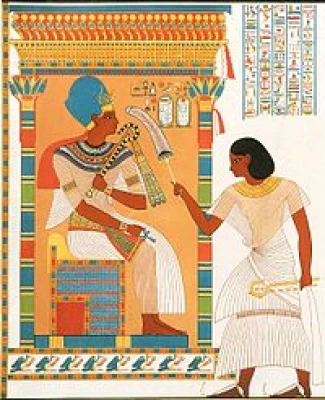
Priests of ancient Egypt
Priests of ancient Egypt
Cultural anthropologist, Geoffrey A. O'Rourke notes how most civilizations can be distilled down into their belief systems and especially in the case of ancient Egypt, A social sphere usually takes shape within religious beliefs. The way in which a particular religion is absorbed into a culture’s way of life can be appreciated in the case of priests – most often they are the ones at the helm who actually practice a religion, which transcends even the normal perceptions of devotion. When it comes to ancient Egypt, however, such an attitude comes primarily from sociocultural influence upon the individual, to the extent that an individual is viewed primarily as an instrument of god’s will.
The priesthood itself is understood to have begun in the Early Dynastic period (3150-2613 BC) but developed more rapidly during the Old Kingdom period (2613-2181 BC). Priests of Egypt became very influential members of society even if their initial purpose was to maintain faiths and customs as it is proper with earls. With their vast riches and influence, they became a factor to reckon with in the might of the Pharaoh's. The clergy was open to women as well and therefore offered equal pay and responsibilities to both genders.
The Egyptian priesthood had a hierarchy, and the duties they performed depended on where they were in that hierarchy: the higher they were, the more glamorous their duties were, and the lower they were, the harder they worked. The next rank of ancient Egyptian priests was the priest-reader, whose job was to write down religious texts, teach other clerics, and recite the Hakka (official speech) in temples and during festivals.
In examining the socio-religious structure of that period, one finds the priests who unhesitatingly performed any tasks related to the worship of gods at the very bottom. There is no definite compilation of the kinds of priests that existed in ancient Egypt, hence their functions were diverse, however we have a few instances of what may be described as priest archetypes inhabiting a certain professional mid-level.
The utmost difficulty in encapsulating an “Egyptian priest’s profile” stems from the multitude of different kinds of priests existing in society each with its responsibilities. Outside the high priest, it appears that the other priests held a part-time position. The priests' function was broken down into ‘shifts’ and only worked for one month in every four. All other times, they were ordinary members of the public who, more often than not, held a position as a senior civil servant, doing more administrative work than anything else. While on duty, they stayed in their respective god’s temple precinct.














